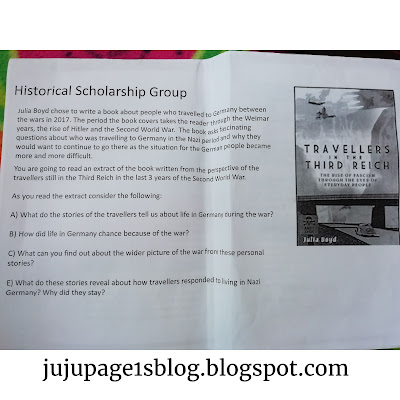Travellers in the Third Reich by Julia Boyd - Lifestyle Monday
Hello everybody and welcome back to another blog post,
Recently I read an extract from the book Travellers in the Third Reich by Julia Boyd as a part of my historical scholarship readings group at school. It was a very interesting read and I far better enjoyed it to the previous extract about Richard the Third. I suppose it's because we can find that modern history is a lot more relatable to our time. It was also, in my opinion, far better written. It was less busy and the point of the historian was clearly set.
My favourite line was "it mattered little if you were a princess or a communist, a Nazi-lover, Nazi-hater, Swede, Sanskrit scholar or Irish nationalist. It was, as Bridget von Bernstorff put it, 'utter hell.'" This suggests that although we may like to think that it mattered that everyone was a loyal and committed Nazi in Germany at the time, everything was so messed up that political views didn't matter anymore. It also suggests that people were so fed up because they knew the end was near that they didn't really care about the political views of others anymore.
You can tell that the historian's point was clear because at the very beginning, she says that the one thing that links all these horrifying events together is the bombing of large cities like Dresden. This was one of the things that we discussed in the group, what exactly were the motives of Germany's opposition. I suggested that it was largely winning but it was also about dimming people's morale and overall will to continue. The bombing led to people feeling tired and fed up and unwilling to continue. Unsurprisingly so when one day people walk home with houses blazing around them and the next morning they're still smouldering.
The other thing that we discussed was despite all the horrifying events, people still looked at the good sides of life. Peg told Bridget, 'A trip to Darmstadt is a weekend in Paris.' In her letter to Bridget she said 'Yesterday there was a huige droning in the air while we were on the train about ten kilometres from here. The train stopped at Lu and I got out and had a delightful walk home through the beautifully tilled fields and fresh green woods.' This suggests that she is always trying to look on the good sides of things even though everything is absolutely terrible.
One of the most important things that we talked about though was that after having read this extract we should perhaps not only think about our own struggle but also what Germany had to go through. Perhaps there's an argument to the fact that Britain won the war, but to ignore the horrifying bombing that we imposed on Germany, that isn't an okay thing to do either.
Generally, it was a good read x
What do you think about Germany's struggle now? Let me know in the comments below and i'll be sure to reply to them. I ♡ hearing from you!
See you next time,
Bye,
XOX,Juliette
My social media handles:
My Instagram
My YouTube channel
My second blog:
The Book Hub
Recently I read an extract from the book Travellers in the Third Reich by Julia Boyd as a part of my historical scholarship readings group at school. It was a very interesting read and I far better enjoyed it to the previous extract about Richard the Third. I suppose it's because we can find that modern history is a lot more relatable to our time. It was also, in my opinion, far better written. It was less busy and the point of the historian was clearly set.
My favourite line was "it mattered little if you were a princess or a communist, a Nazi-lover, Nazi-hater, Swede, Sanskrit scholar or Irish nationalist. It was, as Bridget von Bernstorff put it, 'utter hell.'" This suggests that although we may like to think that it mattered that everyone was a loyal and committed Nazi in Germany at the time, everything was so messed up that political views didn't matter anymore. It also suggests that people were so fed up because they knew the end was near that they didn't really care about the political views of others anymore.
You can tell that the historian's point was clear because at the very beginning, she says that the one thing that links all these horrifying events together is the bombing of large cities like Dresden. This was one of the things that we discussed in the group, what exactly were the motives of Germany's opposition. I suggested that it was largely winning but it was also about dimming people's morale and overall will to continue. The bombing led to people feeling tired and fed up and unwilling to continue. Unsurprisingly so when one day people walk home with houses blazing around them and the next morning they're still smouldering.
The other thing that we discussed was despite all the horrifying events, people still looked at the good sides of life. Peg told Bridget, 'A trip to Darmstadt is a weekend in Paris.' In her letter to Bridget she said 'Yesterday there was a huige droning in the air while we were on the train about ten kilometres from here. The train stopped at Lu and I got out and had a delightful walk home through the beautifully tilled fields and fresh green woods.' This suggests that she is always trying to look on the good sides of things even though everything is absolutely terrible.
One of the most important things that we talked about though was that after having read this extract we should perhaps not only think about our own struggle but also what Germany had to go through. Perhaps there's an argument to the fact that Britain won the war, but to ignore the horrifying bombing that we imposed on Germany, that isn't an okay thing to do either.
Generally, it was a good read x
What do you think about Germany's struggle now? Let me know in the comments below and i'll be sure to reply to them. I ♡ hearing from you!
See you next time,
Bye,
XOX,Juliette
My social media handles:
My Instagram
My YouTube channel
My second blog:
The Book Hub



This sounds like an interesting book. I am going to a luncheon on Saturday where the guest speaker is a lady who lived in Nazi Germany as a child. It should be very interesting. You really never know the whole story and not every German was a Nazi.
ReplyDeleteGlad you find it interesting! Yes, there are always 2 sides to every story. Both sides must be looked at equally before we can judge what happened.
ReplyDelete